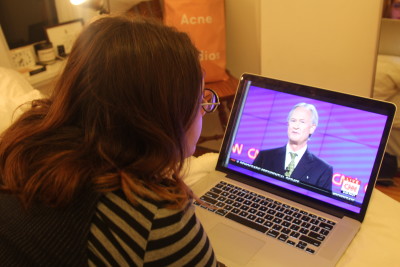Last night CNN hosted the first Democratic primary debate in Las Vegas, Nevada. The debate largely focused on the rivalry between Former Secretary of State Hillary Clinton and Senator Bernie Sanders, leaving Governor Martin O’Malley, Senator Jim Webb, and Governor Lincoln Chafee with noticeably less speaking time. The debate established clear distinctions between the candidates on a variety of issues.
Gun Control
All candidates expressed support for stricter gun control legislation, though Sanders argued that there is an urban/rural divide between what would be the most effective policies for gun control, especially with regards to hunting. The other candidates disagreed, almost all arguing that this divide isn’t real and that their plans for gun control won’t infringe on owning firearms for hunting and personal security uses.
Syria and Russia
Both Clinton and Webb believe that the US should be more active, though not necessarily take the lead, with addressing the Syrian conflict, especially in regards to Russia’s involvement. Sanders, O’Malley, and Chafee caution against getting too involved with a situation that could result in another war and are concerned with the potential repercussion of antagonizing Russia. Sanders declared that Russia will come to regret their involvement in Ukraine and Syria the way many regret our involvement in Iraq.
National Security
The Candidates were asked what they believed to be the greatest national security threat to the country. Chafee said the chaos in the Middle East. O’Malley said nuclear Iran, the spread of ISIL, and climate change. Clinton said the proliferation of nuclear weapons and material. Sanders said climate change. And Webb said China, cyber-warfare, and situations in the Middle East.
Clinton Emails
Clinton was asked how she responded to the controversy surrounding her use of a private email account for government business. She said the she was sick of the issue being brought up and that she’s working with the FBI to show she didn’t do anything wrong. Sanders agreed, saying that the controversy was distracting people from the larger issues.

College Tuition
Clinton and Sanders were asked about college tuition. Both candidates support offering free tuition for public universities, though they differ on how to do this. Sanders wants to tax financial speculations and use that to pay for not only public university tuition but also expanding social security and allowing medicare for all citizens. Clinton touched on her New College Compact, which would give $175 billion in grants to states who can guarantee that their public university studentS don’t have to take out loans. She also added that she would like to see students who fall under this program work at least 10 hours a week without elaborating on what that entail.s
Immigration Reform
Juan Carlos Lopez, one of the co-moderators of the debate, opened the discussion on immigration by asking Bernie Sanders why he voted against the 2007 immigration reform bill. He said that it’s guest worker provisions were exploitative, citing the Southern Poverty Law Center description of it being “semi-slavery.” O’Malley mentioned that he wants to expand Obamacare to undocumented immigrants, while both he and Sanders also stated that they want undocumented immigrants to be offered in-state tuition for university. Clinton said that she would support the states that decide to pursue those policies.
Edward Snowden
The candidates was whether they would punish Edward Snowden or let him walk. Chafee said he didn’t think he should be punished since the federal courts confirmed his claims. Both Clinton and O’Malley said that he should be punished for what they consider to be treasonous actions. Sanders also thinks he should be punished but that the fact he exposed America’s illegal activities should be cause for leniency. Webb said that it should be up for the courts to decide.
Climate Change and Energy
O’Malley said that he has a plan that could make the electric grid of this country run completely on clean energy by 2050. It was pointed out that Webb was the only candidate that openly supported coal, offshore drilling, and the Keystone XL pipeline, though he says that it’s because he chooses the “all of the above” solution to energy dependence. He added that addressing climate change needs to be a global initiative. Sanders said that addressing climate change is moral issue, citing Pope Francis. Clinton proved her commitment to climate change by citing the fact she played a role in getting the first bilateral agreement with China to reduce pollution.
Marijuana
Another question that was exclusively for Clinton and Sanders, both were asked whether they supported the legalization of marijuana. Sanders said he did, despite not personally being a fan, saying that too many people are unjustifiably incarcerated for possession and use. Clinton said she hasn’t decided if legalization is the right path, though she does support medical marijuana.
Enemy Candidates are Most Proud of
The final question fielded to the candidates was who was the enemy they were most proud of making. Chafee said his was the coal lobby. O’Malley’s favorite was the NRA. Clinton listed hers as the NRA, the healthcare and pharmaceutical lobby, Iran, and the Republicans. Sander’s was Wall Street and pharmaceutical companies. Webb’s was an enemy soldier he tried throwing a grenade at him during Vietnam.







